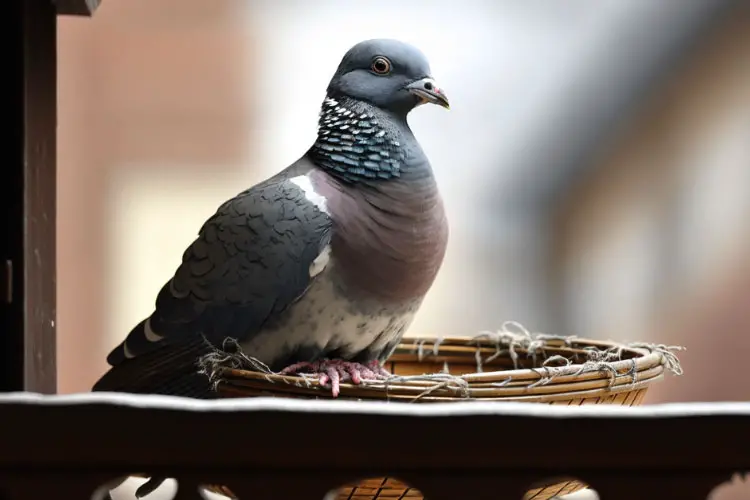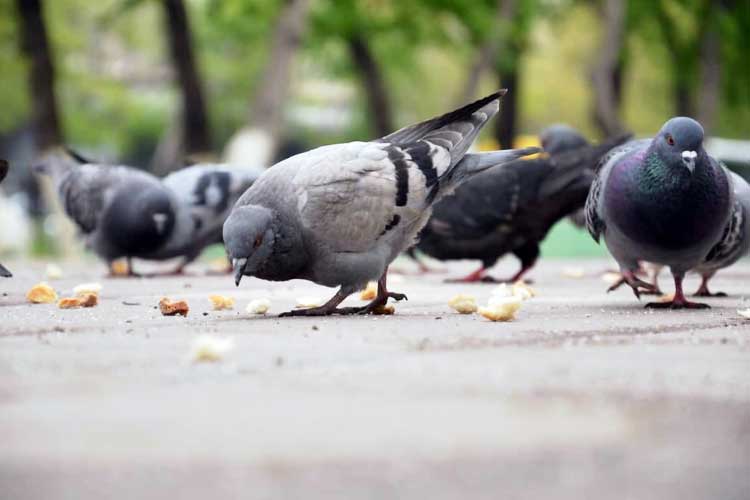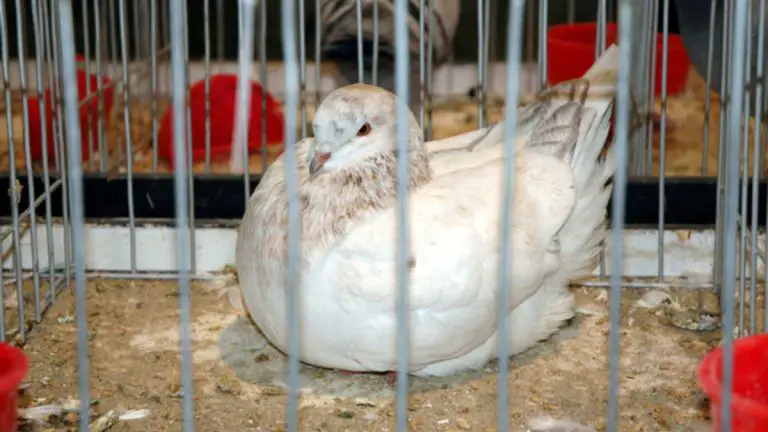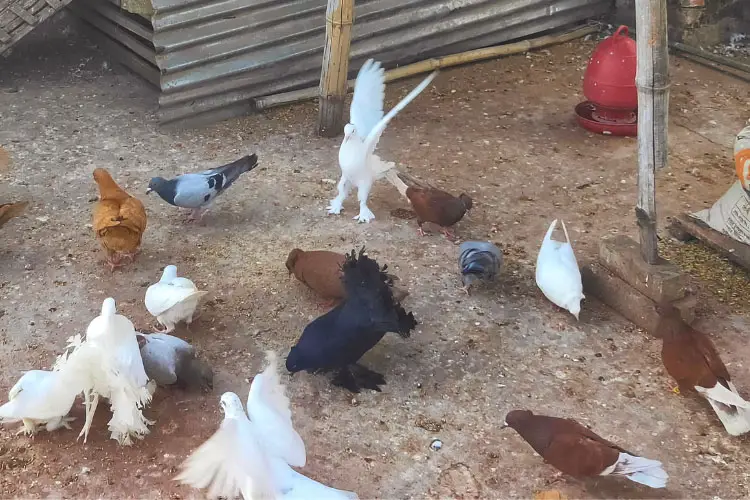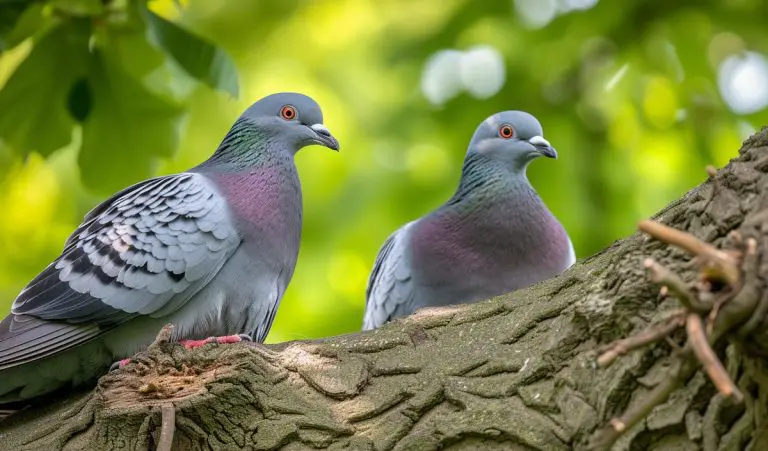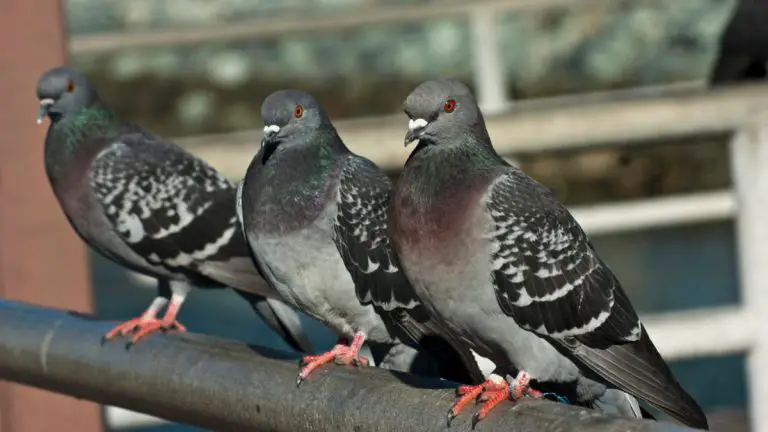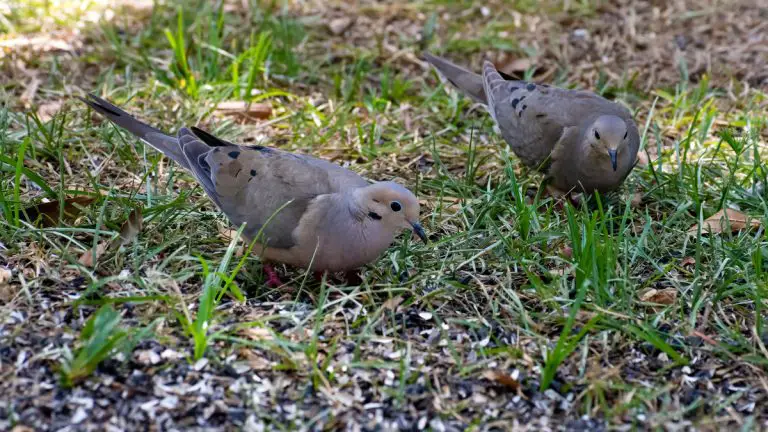Why Do Pigeons Keep Coming To My Balcony And Nesting?-All You Need To Know!
Pigeons nest on top of cliffs in the wild, and balconies are their cliffs in urban settings. And they tend to nest there because it is a familiar setting. Also, there are various reasons pigeons keep coming to your balcony.
So the question is, why do pigeons keep coming to my balcony and nesting? Pigeons are drawn to balconies for various reasons, including food, water, and shelter. Balconies frequently provide pigeons with a safe and secure place to build their nests and view nearby predators.
Understanding why pigeons behave this way is critical to managing the situation. This article will explain why pigeons keep coming to your balcony and how to handle that.
Why Do Pigeons Keep Coming To My Balcony And Nesting?
Pigeons are drawn to balconies for a variety of reasons, including:
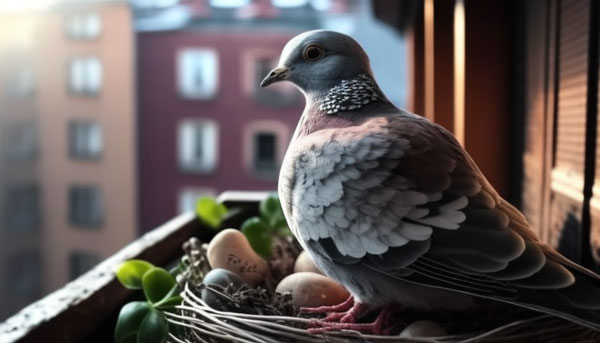
Food Sources
Pigeons are opportunistic feeders, meaning they will eat whatever food they can. People may unintentionally leave food on their balconies or feed pigeons, providing food for the birds. Furthermore, pigeons frequently use balconies to spot food in nearby gardens, parks, or streets.
Safety
Balconies provide a safe and secure environment for pigeons to build their nests and raise their young. Because they are usually protected from predators and the elements, pigeons feel safe on balconies. Furthermore, the birds may feel more secure near human activity.
Familiarity
Pigeons are creatures of habit and are drawn to places they are familiar with. If pigeons have previously nested on your balcony, they may do so again.
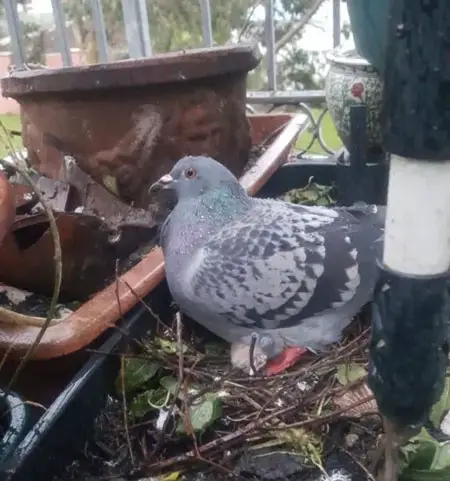
Shelter From The Elements
Balconies can protect from the elements by providing shelter from harsh weather conditions such as rain and wind. Pigeons prefer to nest in safe places where they can raise their young.
Easy Access to Water
Pigeons may be drawn to your balcony if it has easy access to a water source, such as a bird bath or a leaky faucet. Pigeons require water for drinking and bathing.
Ample Space
Balconies frequently provide enough space for pigeons to build nests and raise their young. Pigeons prefer to nest in areas where they can spread their wings and move around freely.
Lack Of Alternatives
Another reason pigeons continue to congregate on balconies is the destruction of their natural habitats. Because of urbanization and increased human activity, many natural habitats for pigeons have been destroyed, making balconies one of the few options for them to nest.
Artificial Surroundings
Pigeons have adapted to cities and are often drawn to man-made structures such as balconies. Balconies’ uniformity and repetition can make them an attractive place for pigeons to roost and build nests.

Human Disturbance
Pigeons are drawn to balconies that are not frequently disturbed by humans. They may feel more secure and visit the area if a balcony is rarely used or unoccupied.
Warmth
Sun-exposed balconies can provide pigeons with a source of warmth, especially during cold weather. Pigeons are drawn to warm places, and balconies can give them a place to warm up and dry off after a rain.
How Do I Keep off Pigeons Coming To My Balcony?
Here are ways to keep pigeons away from your balcony.
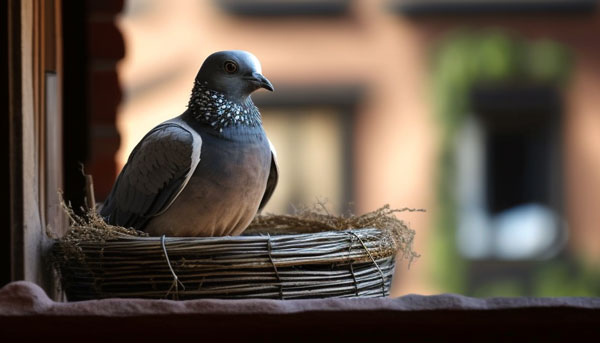
Remove Potential Food And Water Sources
Remove any crumbs or food that has accumulated on your balcony. Food and trash should be stored securely to keep pigeons out. Also, remove any bird baths and fix any leaky faucets.
Install Physical Barriers
Place bird spikes or netting over balconies and other areas where pigeons roost to make landing difficult. You can also place predator decoys, such as owls or hawks, near windows to scare pigeons away.
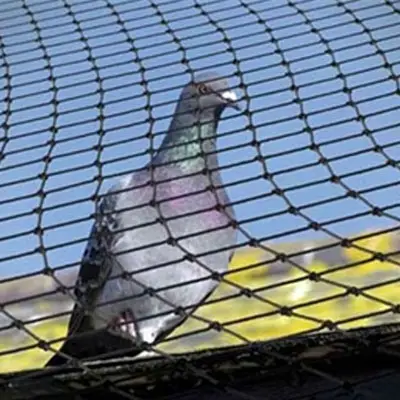
Another effective barrier is motion-activated sprinklers: These devices release a burst of water when motion is detected, effectively scaring pigeons away.
Use Deterrents
Various products are available to repel pigeons, such as bird scarers or electronic deterrents. These devices make noises or flashlights to deter pigeons from landing on your balcony.
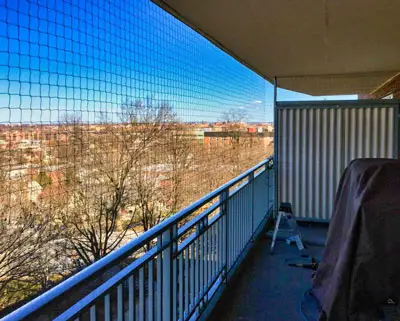
Offering Alternatives
Pigeons can be kept away from balconies by installing birdhouses away from them. Providing bird feeders in various locations can also help reduce the presence of pigeons on balconies.
Apply Anti-Roosting Gel
This sticky substance can make balconies and other areas unappealing to pigeons.
Scent Deterrents
Prickly shrubs or plants with strong scents, e.g., citrus, vinegar, or eucalyptus, can be used to keep pigeons away from your balcony.
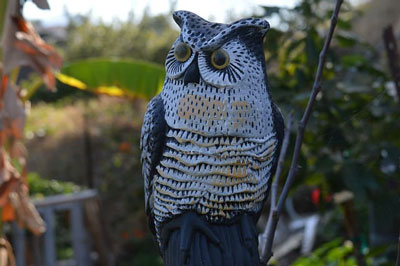
Apply Reflective Deterrents
Hanging shiny objects or strips of reflective tape near your balcony can scare pigeons away with sudden light flashes.
Hire A Professional
A professional will have the necessary tools and knowledge to safely and humanely remove pigeons and keep them from returning. Here is a video to help you understand how to keep pigeons away from your balcony.
Health and Safety Concerns Associated with Pigeons on Balconies
Here is why you should chase pigeons away from your balcony.
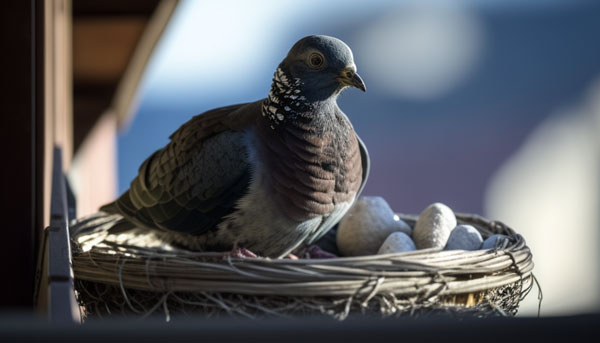
Disease Transmission
Pigeons have been found to carry several diseases and parasites that can be transmitted to humans. These diseases include salmonellosis, histoplasmosis, and cryptosporidiosis.
And these can have serious health consequences, especially in people with compromised immune systems. Furthermore, pigeon droppings may contain fungal spores that, if inhaled, can cause lung infections.
Slip Hazards
Pigeon droppings are slippery when wet and can cause slips on balconies, especially if they accumulate over time. This can be a significant safety concern, especially for young children or the elderly.
Unsanitary Conditions
Pigeon droppings on balconies can create an unsanitary environment and may attract other pests, such as insects. Pigeon nests can also harbor mites and other parasites that are harmful to humans.
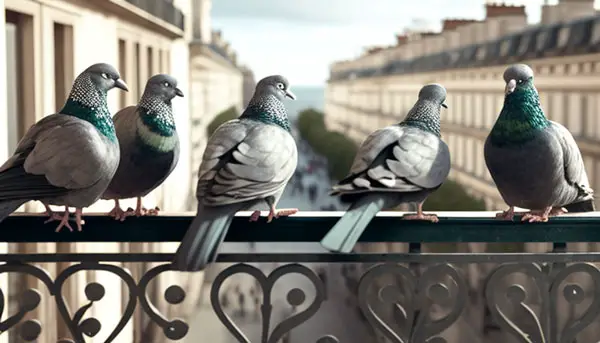
Allergic Reactions
Pigeon droppings can cause allergic reactions in some people, particularly those allergic to birds. Symptoms can range from mild itching and skin irritation to severe respiratory problems.
Structural Damage
Pigeon nests and droppings can cause structural damage to balconies and buildings over time. Pigeon droppings contain acid, which can erode metal surfaces. And an accumulation of droppings and nests can create an unsightly appearance and lower property values.
Property Value Concerns
Pigeons nesting on balconies can impact the building’s property value. Balconies covered in droppings and feathers can be unappealing to potential tenants or buyers, making it more challenging to attract them.

Fire Hazards
Pigeon nests can be a fire hazard, especially if built near electrical wires or other heat sources. Nests can also contain flammable materials such as straw and twigs, which can easily catch fire.
Note that when deciding whether and how to control the pigeon population, keep these health and safety concerns in mind. If you’re having pigeon problems, it’s best to seek professional advice on handling the situation safely and effectively.
Pigeons can be fascinating birds to observe, and if you’re curious about their behavior, you may be wondering why they keep coming to your balcony and nesting there. Perhaps you’ve also noticed that pigeons sometimes chase each other, which can be another intriguing behavior to observe. If you’re interested in learning more about these topics, we have articles that can help. Our article on why pigeons chase each other explores the reasons behind this behavior, while our article on why pigeons keep coming back to your house window looks at some of the factors that might attract these birds to your home. By reading these articles, you can gain a better understanding of pigeon behavior and how to coexist peacefully with these feathered visitors.FAQs
Here are other related questions.
Removing food sources can help reduce the number of pigeons on your balcony, but it may not be enough to eliminate their presence. Other factors, such as the presence of shelter or a lack of alternative nesting options, may still attract pigeons to balconies.
Yes, professional pigeon control services can assist with implementing effective measures to keep pigeons away from balconies. These services may include the installation of physical deterrents, the provision of alternative nesting options, or the safe and responsible use of chemical deterrents.
Pigeons typically nest on balconies during the breeding season, lasting anywhere from a few weeks to several months. The location and the availability of alternative nesting options will determine the duration.
Conclusion
Pigeons nesting on balconies is a common problem for city dwellers. Why do pigeons keep coming to my balcony and nesting? The availability of food sources, shelter, and a lack of alternatives are all reasons for this behavior.
Pigeons on balconies can cause health, structural damage, and property value concerns. It is possible to keep pigeons from balconies while maintaining a clean and healthy living environment if the proper precautions are taken.
